

Story of Change. Over the past several decades, many environmental and social change efforts have come to reflect the centrality of shopping in our culture, suggesting change can be made—or is even best made—through alterations in our individual consumption patterns.
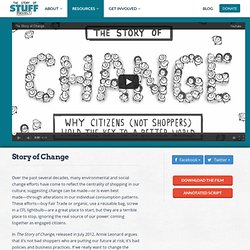
These efforts—buy Fair Trade or organic, use a reusable bag, screw in a CFL lightbulb—are a great place to start, but they are a terrible place to stop, ignoring the real source of our power: coming together as engaged citizens. In The Story of Change, released in July 2012, Annie Leonard argues that it’s not bad shoppers who are putting our future at risk; it’s bad policies and business practices. If we really want to change the world, we have to move beyond voting with our dollars and come together to demand rules that work.
Credits. David Foster Wallace's timeless graduation speech on the meaning of life, adapted in a short film" By Maria Popova “The real value of a real education … has almost nothing to do with knowledge and everything to do with simple awareness.”
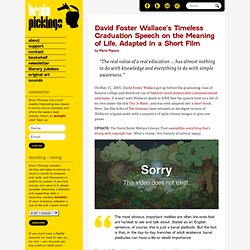
On May 21, 2005, David Foster Wallace got up before the graduating class of Kenyon college and delivered one of history’s most memorable commencement addresses. It wasn’t until Wallace’s death in 2008 that the speech took on a life of its own under the title This Is Water, and was even adapted into a short book. Now, the fine folks of The Glossary have remixed an abridged version of Wallace’s original audio with a sequence of aptly chosen images to give one pause: UPDATE: The David Foster Wallace Literary Trust exemplifies everything that’s wrong with copyright law.
The most obvious, important realities are often the ones that are hardest to see and talk about. Hear the full speech in its sublime entirety, along with transcript and highlights, here, then wash it down with Wallace on ambition and why writers write. Thanks, Matt Donating = Loving. Delhi to reuse 80 per cent sewage by 2027.
With no new dams in sight, the draft Delhi Water Policy, 2013 calls for reuse of treated sewage to achieve water security in the capital Delhi’s 2051 water demand at the norm of 172 litres per person per day works out to 1,018 million gallons a day.
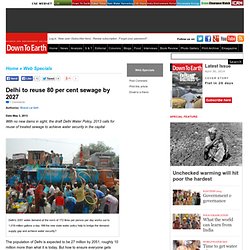
Will the new state water policy help to bridge the demand-supply gap and achieve water security? The population of Delhi is expected to be 27 million by 2051, roughly 10 million more than what it is today. But how to ensure everyone gets sufficient water even in the present time is a matter that remains unresolved. Happy Birthday, Viktor Frankl: Timeless Wisdom on the Human Search for Meaning. By Maria Popova “Live as if you were living already for the second time and as if you had acted the first time as wrongly as you are about to act now!”
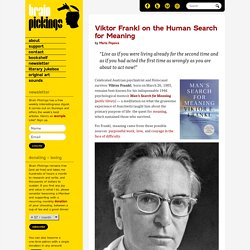
Celebrated Austrian psychiatrist and Holocaust survivor Viktor Frankl, born on March 26, 1905, remains best-known for his indispensable 1946 psychological memoir Man’s Search for Meaning (public library) — a meditation on what the gruesome experience of Auschwitz taught him about the primary purpose of life: the quest for meaning, which sustained those who survived. Work Alone: Ernest Hemingway's 1954 Nobel Prize Acceptance Speech. Henry Miller on the mystery of the universe and the meaning of life. By Maria Popova “This is the greatest damn thing about the universe.
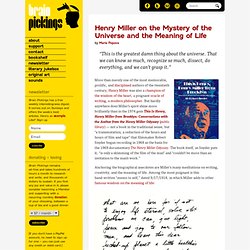
That we can know so much, recognize so much, dissect, do everything, and we can’t grasp it.” Sherwood Anderson on Art and Life: A Letter of Advice to His Teenage Son, 1927. By Maria Popova “The object of art is not to make salable pictures.
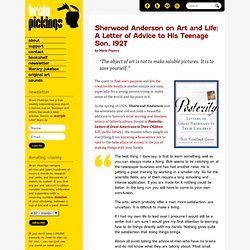
It is to save yourself.” The quest to find one’s purpose and live the creative life boldly is neither simple nor easy, especially for a young person trying to make sense of the world and his place in it. In the spring of 1926, Sherwood Anderson sent his seventeen-year-old son John a beautiful addition to history’s most moving and timeless letters of fatherly advice. Found in Posterity: Letters of Great Americans to Their Children (UK; public library), the missive offers insight on everything from knowing whose advice not to take to the false allure of money to the joy of making things with your hands: The best thing, I dare say, is first to learn something well so you can always make a living.
Magnum Photos - Search Result. A dog sniffing at me. Bertrand Russell on human nature, construction vs. destruction, and science as a key to democracy. By Maria Popova In 1926, British philosopher, mathematician, historian, and social critic Bertrand Russell — whose 10 commandments of teaching endure as a timeless manifesto for education, whose poignant admonition is among history’s greatest insights on love, whose message to descendants should be etched into every living heart — penned Education and the Good Life (public library), exploring the essential pillars of building character through proper education and how that might relate to broader questions of politics, psychology, and moral philosophy.
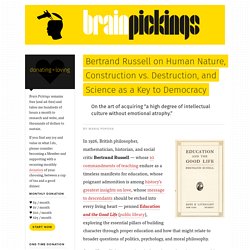
One of Russell’s key assertions is that science education — something that leaves much to be desired nearly a century later — is key to attaining a future of happiness and democracy: